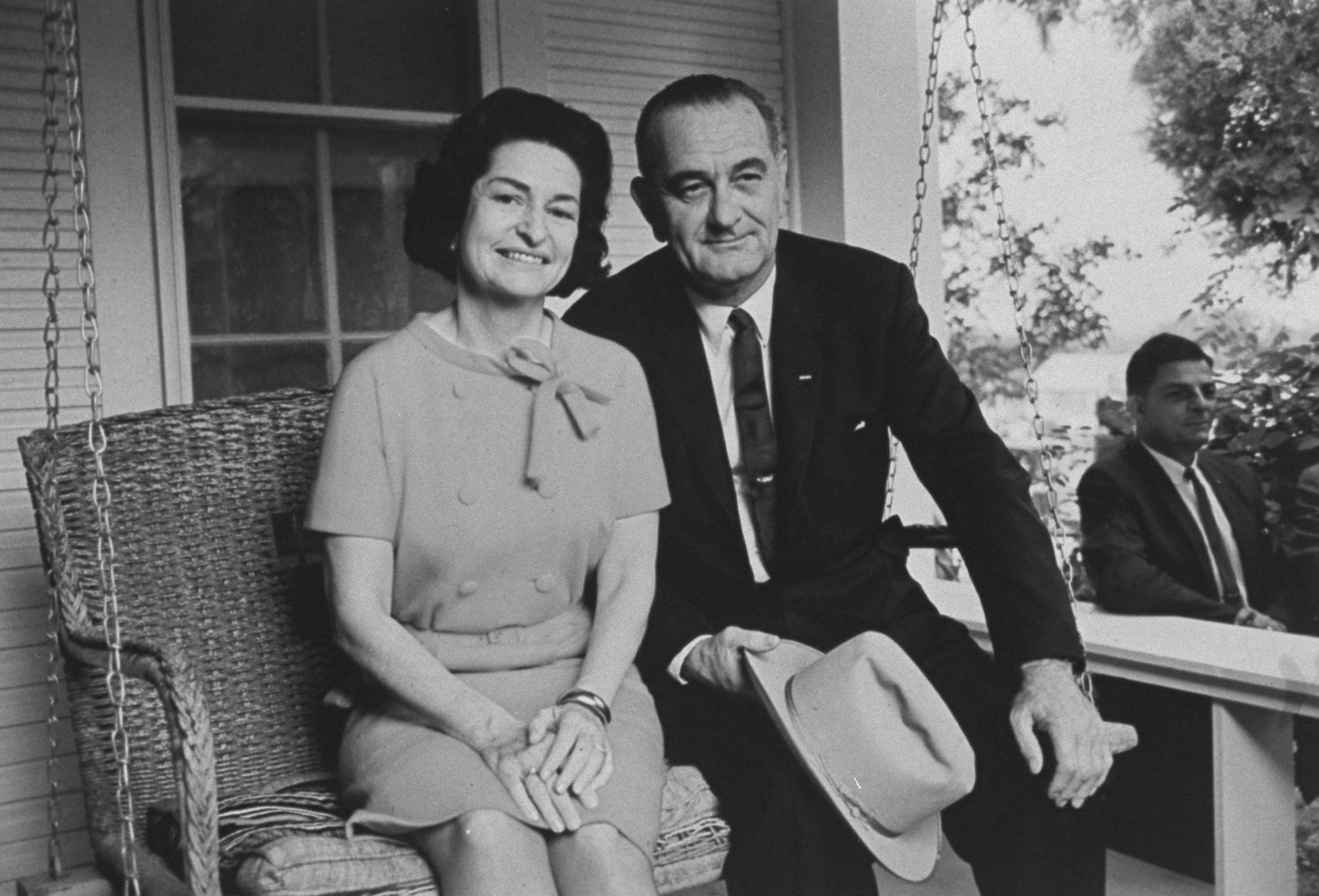First Counselor
Lady Bird Johnson
By Michael F. Bishop
Lyndon Baines Johnson, the former Senate Majority Leader who reached the White House in the wake of President John F. Kennedy’s assassination, was to all appearances a politician of inexhaustible energy. He had been the undisputed “Master of the Senate,” in the words of biographer Robert Caro, and after a frustrating and unrewarding interlude as Kennedy’s vice president, became a president able to bend even the most stubborn opponent to his will. He proposed and signed torrents of domestic legislation that expanded civil rights and the welfare state and led the United States into a land war in Asia. Johnson defeated Senator Barry Goldwater in the 1964 presidential election in what was then the greatest landslide victory in American political history. He seemed an unstoppable force of nature.

But his wife, Lady Bird Johnson, knew better. She was at his side as he recovered from gall bladder surgery in 1965 and listened as he moaned from his hospital bed that he was overwhelmed by the presidency and wished only to return to his native Texas. She wrote in her diary, “here is the black beast of depression back in our lives,” and it was she who soothed him and ensured that he would carry on. As Peter Baker observed last year in the New York Times, the First Lady “not only provided a spouse’s emotional ballast but also served as an unrivaled counselor who helped persuade him to stay in office at critical junctures, advised him on how to use the office to achieve their mutual goals, guided him during the most arduous moments and helped chart his decision to give up power years later.”
Claudia Alta Taylor, the president’s “unrivaled counselor,” was born in genteel circumstances in east Texas in 1912. The nickname “Lady Bird” was bestowed upon her in childhood, and it was by this name she would be known for the rest of her life. Exceptionally bright, she earned honors degrees in history and journalism from the University of Texas. Soon thereafter she met a young and supremely ambitious aspiring politician named Lyndon Johnson, and they were married after a brief courtship. They had two daughters, Lynda Bird, and Lucy Baines, both of whom would gracefully live in the glare of politics for much of their lives.
Lady Bird devoted much of her considerable inheritance to furthering her husband’s career, and her exquisite tact helped calm the waters stirred up by his often coarse and overbearing manner. Her shrewd investments helped build the family fortune, and her unwavering loyalty helped ease her husband’s political ascent. She stoically endured his constant infidelities and took on the challenging role of therapist for this most mercurial of men. And she was at his side as he took the oath of office as the 36th president aboard Air Force One on November 22, 1963, with a stricken Mrs. Kennedy looking on, her suit stained with her husband’s blood.
Mrs. Johnson was an active First Lady, expanding and formalizing the role. She used her influence to make the nation’s capital a more beautiful place through the planting of flowers and gardens. She wished to do the same for the nation at large; the country’s landscape was increasingly blighted by an expanding road system punctuated with countless garish billboards. The Highway Beautification Act, which she energetically supported, was signed by her husband in 1965 and helped smooth the rough edges of the interstates. As she saw it, beautification was a “whole effort to bring the natural world and the man-made world into harmony; to bring order, usefulness and delight to our whole environment.”
But during her tenure as First Lady, there was little harmony or delight to be found in southeast Asia. The grim and seemingly endless war in Vietnam took a terrible emotional toll on the president and his family, as it did on the nation. The constant refrain of protestors on Pennsylvania Avenue echoed through the halls of the White House: “Hey, hey, LBJ! How many kids did you kill today?” In this bleak environment her care for, and understanding of, her husband was even more important. And her wise counsel continued: just as she had encouraged him to hold on to power a few years before, now she advised him to give it up. This he duly did, announcing to a shocked nation on March 31, 1968: “I shall not seek, and I will not accept, the nomination of my party for another term as your president.”
Mrs. Johnson, increasingly worried about her husband’s precarious health, was happy to return to Texas ten months later. There, she doted on him until his death, four years and two days after they departed the White House. Her accomplishments were recognized later, as she was awarded the Presidential Medal of Freedom in 1977 and the Congressional Gold Medal in 1988. Lady Bird Johnson, her husband’s indispensable partner, died in 2007 at the age of 94, her status as one of the most admired First Ladies in American history secure.
Michael F. Bishop, a writer and historian, is the former executive director of the International Churchill Society and the Abraham Lincoln Bicentennial Commission. He is the author of “We Shall Fight: Churchill’s Greatest Speech,” to be published by HarperCollins.



